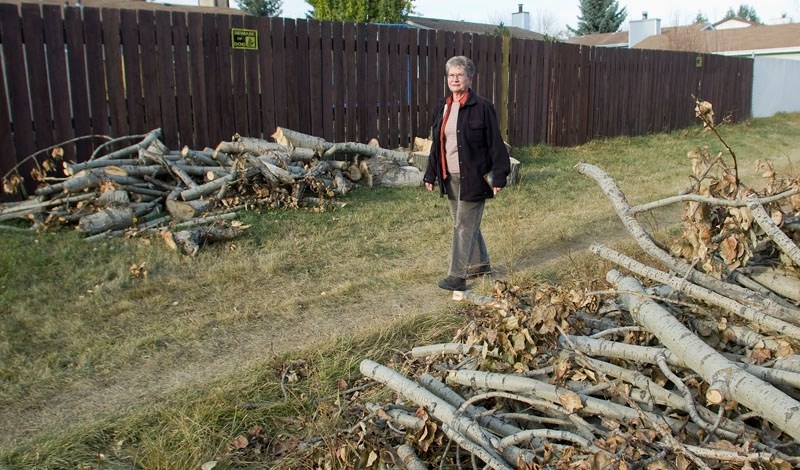An Akinsdale resident is raising a red flag over illegal dumping along a popular neighbourhood walk.
Trudy Madsen says she’s lived in Akinsdale for about 25 years and has long enjoyed walking along its southeastern border, which is the transportation utility corridor (TUC) for the Anthony Henday. About four years ago, she noticed a contractor dumping loads of grass, branches and trees into the area instead of hauling it to the compost dump. She called bylaw officers, but they said they couldn’t do anything since the corridor wasn’t in their jurisdiction.
That wasn’t an isolated incident. A quick stroll down the path with Madsen suggests this has been going on for years. “Here’s where they cut trees down and dropped it over the fence,” she says, pointing out a two-metre-wide pile of stumps by the path. And here’s a waist-high pile of branches and grass clippings — it’s seven metres long and so overgrown that it looks like a hill.
“Whatever they need to do in their yard, they dump it out here,” she says. “You can’t walk in those bushes anymore because it’s filled with yard garbage.”
The TUC is meant for roads and utilities, says Fred Weber, who manages the region for Alberta Infrastructure, and not for garbage. Anyone who does chuck stuff into it can be charged with dumping and/or trespassing.
It’s tough to catch violators in the act due to the size of the region, Weber admits, but they do patrol the TUC regularly. It can be tough to figure out who has jurisdiction in any one area, but the region by Akinsdale appears to be part of the City of Edmonton.
Dumping trash in a TUC or ravine is a bad idea, says St. Albert environmental manager Leah Jackson. You end up overloading the region’s compost capacity, creating large hills and a big stink, and you attract animals, causing traffic hazards.
Madsen says she just wants the dumping to stop. “We have a compost site in St. Albert, and I think people should use it.”
Any concerns about dumping in the TUC should go to Weber at 780-422-1135.
A new non-profit group could soon help St. Albert neighbourhoods go green without spending tons of cash.
The Solar Energy Society of Alberta is hosting a talk next week by Shanthu Mano and Godo Stoyke, the folks behind the eco-consulting group Carbon Busters. The Edmonton couple is starting a new non-profit group called C Returns that aims to help neighbourhoods do energy efficiency retrofits.
Mano said next week’s talk will be the launch of the group that she hopes will eventually spread throughout Alberta. The idea is to see a return on investment, she says of the group’s name, both in terms of money and greenhouse gas reductions.
About 39 per cent of our carbon emissions come from buildings, Mano says, and about 80 per cent of those buildings will still be around in 2050. Environmental groups generally agree that retrofitting these buildings will be a vital part of any greenhouse gas reduction plan.
But not too many people are doing retrofits, Mano says, partly because of finances and partly because of time — people don’t have the time or knowledge to hire contractors and compare products to find the best, say, boiler on the market.
C Returns proposes to help neighbourhoods do the audits and find the money for retrofits, Mano says. For a small fee, the group will do energy audits of a community and do a cost-benefit analysis of various retrofits. Once the community chooses one, the group will hire the contractors and buy the necessary materials.
The group also plans to have a revolving loan to help neighbourhoods afford retrofits, Mano says. These loans are paid for by the energy savings produced by the renovations, essentially making them cost-free.
The group plans to start with 31 homes in Edmonton next year, Mano says, and to retrofit about 1,500 in three years. If they do, they’ll help Albertans save about $3.2 million in energy costs and keep about 321,900 tonnes of emissions out of the air.
The talk starts at 7 p.m. Oct. 26 in the CN Theatre at Grant MacEwan University. For details, visit solaralberta.ca.




